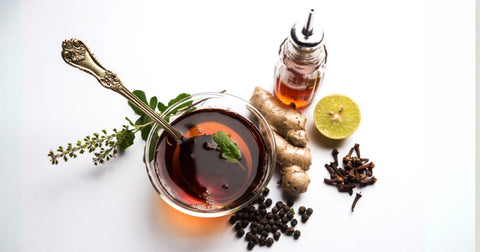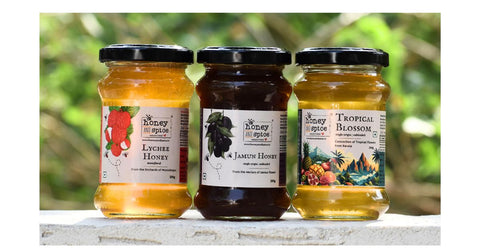In this blog, we’ll explore the medicinal uses of honey and how it can support various health needs. From a natural sugar substitute for cancer patients to potential relief for rheumatoid arthritis, eczema, and psoriasis, honey offers many healing benefits.
We’ll also cover its role in skin care, including whether it can help with whiteheads. Dive in to discover how honey can be a powerful addition to your wellness routine.
Medicinal Uses of Honey

Honey’s antioxidant, anti-inflammatory, immune-modulating, and wound-healing properties make it a valuable adjunctive treatment. Its application ranges from supporting overall health and managing side effects to potentially offering direct therapeutic benefits.
Honey has been investigated for its potential supportive care in various conditions due to its bioactive compounds and physiological effects.
Here’s how honey can be used in treatment:
What is a Good Sugar Substitute for Cancer Patients?

Honey is a good substitute for sugar, especially for cancer patients undergoing treatments like chemotherapy or radiation. Maintaining balanced nutrition can be challenging, as these treatments often weaken the immune system, cause fatigue, and lead to side effects like mouth sores, digestive issues, and loss of appetite.
A healthy diet becomes essential, and honey, as a natural sweetener, provides a nutritious alternative to refined sugar. Honey’s unique properties can help support immunity, soothe sore throats, and aid digestion, making it an ideal choice for those seeking a gentle yet nourishing sugar substitute.
Honey may serve as a valuable tool in managing cancer, not just as a sweetener, but also providing benefits such as antioxidant protection, antimicrobial properties, immune support, and aid in wound healing. It can complement conventional treatments and support overall health in several ways.
Disclaimer: Honey is not a medical cancer treatment. It can be used as a facilitator of good health for people suffering from cancer, but it is essential to consult with a healthcare provider for proper medical advice. Always follow your doctor's recommendations for cancer treatment.
Here’s how honey is used in cancer treatment:
1. Potential Anti-Cancer Properties
A. Direct Impact on Cancer Cells
- The potential for honey to directly impact cancer cells is still under study. While early research is promising, honey should be viewed as a complementary health food rather than a cancer treatment.
- It may offer immune support, inflammation reduction, and general well-being benefits.
- Studies were done by National institutes of health (NIH) that certain types of honey, such as Acacia honey, may have direct anti-cancer effects by inhibiting the growth of cancer cells and enhancing the effectiveness of chemotherapy.
- These findings are still under investigation, and more research is needed to understand these effects fully.
2. Psychological and Emotional Comfort
A. Offering Comfort
- Using honey in food and beverages can provide a comforting and familiar taste, which can benefit emotional well-being.
- Feeling a sense of normalcy and enjoyment in eating can positively affect the overall experience of cancer treatment.
3. Complementary Treatment
A. Managing Side Effects
- Honey can be used to help manage some side effects of cancer treatments, such as sore throats, mouth ulcers, and digestive discomfort.
- Its soothing and antimicrobial properties can provide relief and comfort during treatment.
4. Wound Healing
A. Supporting Recovery
- Cancer treatments like chemotherapy and radiation can cause sores and wounds.
- Honey’s natural antimicrobial and healing properties can aid in the recovery of these wounds, promoting faster healing and reducing the risk of infections.
It ranges from supporting overall health and managing side effects to potentially offering direct therapeutic benefits in cancer care. However, it should be used as part of a comprehensive treatment plan by medical professionals to ensure optimal safety and effectiveness.
Honey for Rheumatoid Arthritis
Honey can be used as a complementary therapy for rheumatoid arthritis (RA) due to its anti-inflammatory, antioxidant, and healing properties. When used alongside conventional treatments, it may help manage symptoms and improve overall well-being. it helps manage symptoms and improve overall well-being when used alongside conventional treatments.
Here’s how you can use honey for rheumatoid arthritis:
1. Joint Health and Pain Relief

- The anti-inflammatory and antioxidant properties of honey can contribute to reduced joint pain and stiffness.
- Honey can be applied topically in the form of a warm compress or mixed with other anti-inflammatory substances like turmeric or ginger.
- Applying honey directly to the affected joints might provide localized relief.
2. Complementary Therapy
- Honey can be used as part of a holistic approach to managing RA, alongside conventional medications and therapies.
- Honey can be incorporated into daily meals and beverages.
3. Support for Overall Health
- Honey can be a source of natural energy and nutrients, supporting overall well-being and immune function.
- Including honey in a balanced diet can help maintain energy levels and general health, which is important for managing a chronic condition like RA.
It may help reduce inflammation, support joint health, and improve overall well-being when used as part of a comprehensive treatment plan. Always work with healthcare professionals to ensure that honey is used safely and effectively alongside conventional RA treatments.
Honey for Eczema Treatment?
Honey can be an effective natural remedy for managing and treating eczema due to its moisturizing, antibacterial, anti-inflammatory, and wound-healing properties.
Here’s how you can use honey for eczema treatment :
1. Moisturizing And Soothing The Skin
- Honey is a natural humectant, meaning it helps retain moisture in the skin, which is crucial for managing eczema, as dry skin can exacerbate the condition.
- Apply a thin layer of raw honey directly to the affected areas.
- Leave it on for about 20-30 minutes before rinsing off with warm water.
- This can help hydrate the skin, reduce itching, and prevent further dryness.
2. Reducing Itchiness
- Honey’s soothing properties can help reduce the intense itchiness associated with eczema, which can lead to further skin damage if scratched.
- Apply a honey mask to itchy areas to help calm the skin and reduce the urge to scratch.
3. DIY Honey Eczema Treatments
A. Honey and Oatmeal Mask
- Mix honey with finely ground oatmeal to create a paste.
- Oatmeal is known for its soothing properties and can enhance the effects of honey.
- Apply this mixture to affected areas to help soothe and moisturize the skin.
B. Honey and Coconut Oil Balm
- Combine honey with coconut oil, which also has moisturizing and antimicrobial properties.
- This balm can be applied to eczema patches to provide relief and protection.
Honey, particularly raw honey, can be a valuable natural remedy for eczema, When used consistently and appropriately, honey can complement conventional eczema treatments and contribute to improved skin health and reduced symptoms.
Can Honey Remove Whiteheads?
Yes, Honey can be an effective natural remedy for removing whiteheads due to its antibacterial, anti-inflammatory, and moisturizing properties. Whiteheads, a type of acne, occur when pores are clogged with oil, dead skin cells, and bacteria.
Here's how you can use honey for removing whiteheads:
1. Exfoliation
- Honey can help gently exfoliate the skin due to the presence of mild natural acids like gluconic acid.
- This helps remove dead skin cells that can clog pores and lead to whiteheads.
- Mix honey with a small amount of baking soda or ground oats to create a gentle exfoliating scrub.
- Apply this to the face in circular motions, focusing on areas with whiteheads, then rinse thoroughly.
2. DIY Honey Treatments
A. Honey and Cinnamon Mask
- Cinnamon has additional antibacterial properties.
- Mixing honey with a small amount of cinnamon can enhance its effectiveness against whiteheads.
- Apply the mixture to the face, leave it on for 10-15 minutes, and then rinse off.
B. Honey and Lemon Mask
- Lemon juice has astringent properties that can help tighten pores.
- Mix honey with a few drops of lemon juice and apply it to the face.
- This combination can help reduce whiteheads by cleaning out the pores and balancing oil production.
When used regularly, honey can help clear up whiteheads and improve overall skin health, Incorporate honey into your skincare routine alongside other treatments to your skin’s needs.
Honey for Psoriasis Treatment
Honey can be a helpful natural remedy in managing psoriasis due to its moisturizing, anti-inflammatory, and wound-healing properties. Psoriasis is a chronic skin condition characterized by red, scaly patches that can be itchy and painful, it may help alleviate symptoms and improve the condition of the skin.
Here’s how you can use honey for psoriasis treatment:
1. Anti-Inflammatory Properties
- Honey has anti-inflammatory properties that can help reduce the redness, swelling, and irritation associated with psoriasis plaques.
- Use honey as a topical treatment on inflamed areas of the skin.
- It can be applied alone or mixed with other anti-inflammatory agents like turmeric or aloe vera.
- Regular application can help soothe the skin and reduce flare-ups.
2. Antimicrobial Protection
- Honey has natural antimicrobial properties, which can help prevent infections in areas of the skin affected by psoriasis, especially where the skin is broken.
- Applying honey to the skin can help create a barrier that protects against bacterial infections, which can worsen psoriasis symptoms.
Combining Honey with Other Treatments
- Honey and Beeswax Mixture: A combination of honey, beeswax, and olive oil has been studied for its effectiveness in treating psoriasis. This mixture can be applied to the skin to provide a protective, moisturizing barrier.
- Honey and Coconut Oil: Mixing honey with coconut oil can enhance its moisturizing effects. Coconut oil also has anti-inflammatory and antimicrobial properties, making it a good complement to honey in psoriasis treatment.
When used as part of a comprehensive skincare routine, honey may help alleviate the symptoms of psoriasis, reduce flare-ups, and improve the overall condition of the skin, it’s essential to use honey as a complementary treatment and consult with a healthcare provider for a holistic approach to managing psoriasis.
Explore The Benefits Of Honey For Treatments:
Choose high-quality honey! Honey and Spice offers significant benefits for managing conditions, thanks to its natural moisturizing, anti-inflammatory, and wound-healing properties, the best nature has to offer.
By trusting us, you're embracing a natural and effective way to enhance.







